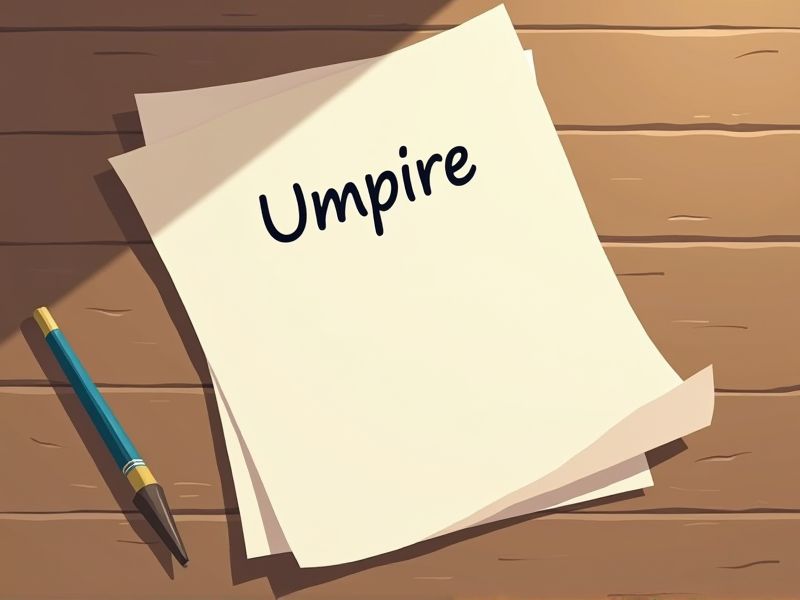
Umpires play a vital role in maintaining the integrity and fairness of sports, making it crucial for them to possess certain certifications. Understanding the rules, regulations, and nuances of the game enhances their decision-making skills. Certifications provide essential training and validation that an umpire is equipped with the necessary knowledge and skills to officiate at different levels. These are some important certifications you may need to become an umpire.
Professional Baseball Umpire Certification
Professional Baseball Umpire Certification is needed to ensure consistency and accuracy in officiating, as it provides a standardized training regimen that all umpires must adhere to. This certification enhances the credibility of the umpire in the eyes of players, coaches, and fans, reducing contentiousness over game decisions. It equips umpires with the necessary knowledge of rules and the ability to apply them accurately during high-pressure situations. Certification also opens up wider career opportunities, enabling umpires to progress to higher levels of the sport.
Minor League Umpire Certification
Minor League Umpire Certification ensures umpires have the necessary skills and knowledge to effectively officiate games, enhancing the quality and integrity of the sport. Comprehensive training provided during certification courses helps umpires make accurate and consistent calls, reducing disputes and maintaining fair play. Certification serves as a standardized benchmark for competency, allowing leagues to maintain a professional standard and uphold the game's rules. Certified umpires can better handle high-pressure situations, contributing to a smoother and more efficient game flow.
Youth Baseball Umpire Certification
Youth Baseball Umpire Certification ensures knowledge of official rules, preventing disputes and maintaining fairness during games. Certification provides training in safety protocols, reducing the risk of injuries to players and officials. It enhances communication skills, fostering better interaction with coaches and players. Certified umpires maintain the integrity of the sport, promoting a positive experience for all participants.
Collegiate Baseball Umpire Certification
Collegiate Baseball Umpire Certification ensures umpires have a comprehensive understanding of NCAA rules, fostering consistent and fair officiating during games. Certification programs provide training on situational awareness and decision-making, which reduces errors and enhances game integrity. Certified umpires tend to earn greater respect from players and coaches, contributing to smoother game management and fewer disputes. Having a standardized certification process helps maintain a high level of competence and professionalism in collegiate baseball, benefiting the sport as a whole.
Advanced Officiating Techniques Certification
Advanced Officiating Techniques Certification enhances an umpire's decision-making skills by incorporating the latest rules and regulations, leading to more accurate calls. This certification provides umpires with sophisticated communication strategies, essential for effectively managing on-field conflicts. It equips them with knowledge about modern technology, such as instant replays, which is crucial for integrating tech advancements in sports. A certified umpire demonstrates credibility and professionalism, increasing trust with players, coaches, and fans.
Sports Officiating Rules Certification
Sports officiating rules certification ensures that umpires consistently apply the rules of the game, reducing discrepancies in decisions. Proper certification enhances the credibility of umpires, gaining the trust of players, coaches, and spectators. Certified umpires are better equipped to manage conflicts on the field, leading to smoother game progression. A standardized certification process can decrease bias and improve the overall integrity of sports competitions.
First Aid and CPR Certification
Umpires are often present at sports events where participants can sustain injuries, necessitating immediate care. First Aid and CPR certification equips them with essential skills to respond effectively to on-field accidents. Quick action can prevent further harm in critical situations like cardiac arrest or severe injury. Certification also ensures compliance with safety regulations set by sports governing bodies.
Conflict Resolution in Sports Officiating Certification
Conflicts are inevitable in sports, and umpires often find themselves at the center of disputes, so having conflict resolution skills is crucial for maintaining a fair game environment. A certification in conflict resolution equips umpires with strategies to effectively manage disputes, leading to smoother game operations. Mismanaged conflicts can escalate tensions and negatively impact the perception of the game's fairness. Umpires with this certification can enhance their credibility and ensure a more respectful and sportsmanlike atmosphere.
Communication Skills for Sports Officials Certification
Sports officials need a Communication Skills for Sports Officials Certification because it helps them manage on-field disputes more effectively, leading to smoother game flow. Enhanced communication skills help umpires accurately convey decisions, reducing the likelihood of misunderstandings with players and coaches. This certification provides umpires with tools to maintain authority while fostering a respectful environment. In pressure-filled moments, strong communication aids in conflict resolution, ensuring the focus remains on the game rather than disagreements.
Diversity and Inclusion in Officiating Certification
Diversity and inclusion in officiating certification help ensure fair representation and equitable opportunities for all umpires, which can lead to a more comprehensive understanding of diverse teams and players. The presence of varied perspectives among umpires can enhance decision-making and reduce implicit bias in crucial game moments. A diverse officiating body can improve the quality of the game by fostering a more inclusive environment for players and fans alike. Training in diversity and inclusion also equips umpires with better communication skills, crucial for resolving conflicts and maintaining respect on and off the field.
Summary
When you receive certifications as an umpire, your credibility significantly increases, enhancing trust among players and leagues. Certified umpires often see more opportunities for officiating higher-level games. Improved skills and knowledge from certification generally lead to better on-field decision-making. This expertise can result in enhanced career prospects and increased professional recognition.
